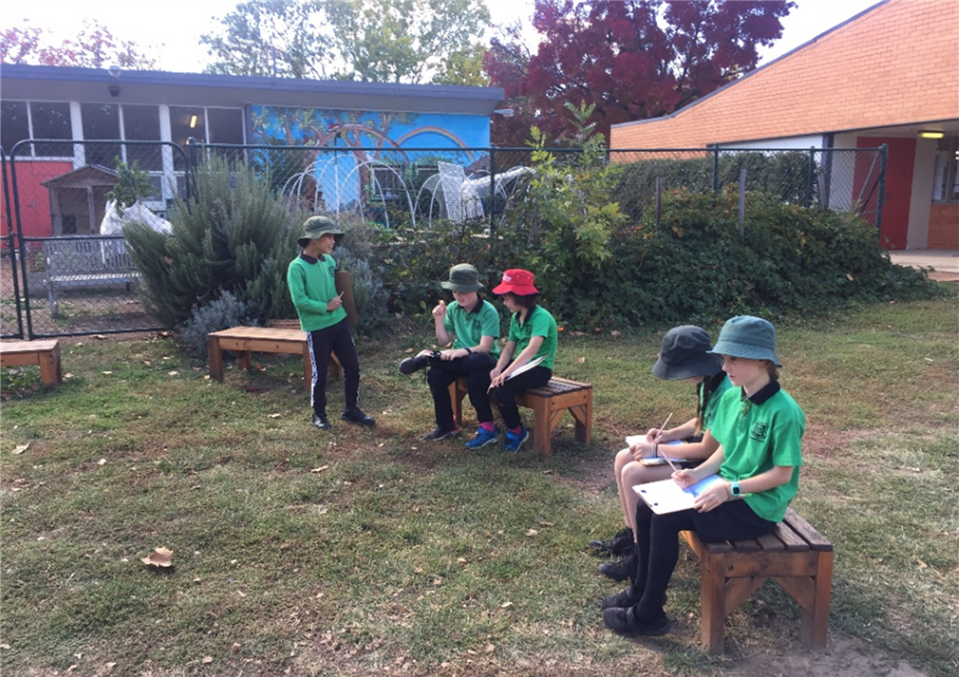
In partnership with the P&C, Turner School has been building outdoor learning spaces over the last few years. A central component is their Cultural Integrity Garden.
“The Cultural Integrity Garden was initiated in 2019 to connect students to Country, to local plants and their use, and to introduce Aboriginal ways of being, story telling and sharing,” says Nicola Gibson, Turner School’s P&C President.
“It is a space where four or five classes can come together to yarn, learn, listen, and deepen their ability to collaborate and connect with people, Country and history,” she says. “It’s also a place where the community will be able to meet, share, and appreciate this Country.”
“COVID restrictions have obviously meant we’ve not yet been able to open the garden to parents and the community, but we now have a wonderful space for presentations, smaller school events and ceremonies in the future. Larger events, like the school fete or end of year concert will be able to spill in and around the garden. It’s a centre point and lovely place to be.”
The journey has been a long one, and has involved a lot of learning – for staff, students and parents.

In 2019, staff and students started with a Walk on Country with Adam Shipp, a Wiradjuri ranger, learning about traditional plant use.
Students then collaborated to design their visions of how the space would be used and features they would like incorporated.
Community working bees got parents involved with the construction – and the learning! – and students across the school have planted the gardens.
“We hope that having the parent community take part in the physical construction of the garden will strengthen and reinforce the ideas of sustainability and cultural integrity at home as well as at school,” Nicola tells us.
Weatherproof building and seating elements are interspersed with a dry creek bed and seasonal plantings that flower at each month of the year, educating the students on Aboriginal ways of noticing changes to the environment based on weather.
Students will also be involved in planting and maintaining different bush tucker plants that they will be able to take ownership to care for each year.
There have been some added bonuses – the garden helped students continue to feel connected to the school during remote learning last year.
“Students created musical raps to go with our garden poem as well as painting and sculptures that reflected the garden as a place to connect with Country,” says Nicola. “And not having the kids here for a while – and all the wet weather – has given the shrubs and trees a solid chance to establish. Plus, it’s been a healthy outdoor space for learning since school returned.”
 “We continue to remind our community about this special space we constructed together. And look forward to an official opening that everyone can attend to admire and enjoy what we have created. As families move through their school years, they can watch our garden grow and be reminded of how far we have all come!”
“We continue to remind our community about this special space we constructed together. And look forward to an official opening that everyone can attend to admire and enjoy what we have created. As families move through their school years, they can watch our garden grow and be reminded of how far we have all come!”
A number of other schools have also created Indigenous gardens, yarning circles, and Cultural Integrity spaces for community connection and learning using the ACT Government’s Parental Engagement Grants. In total, 35 schools or P&Cs received funding for a range of community-strengthening projects.
In Council’s conversations with Ngunnawal Elder, Aunty Violet Sheridan (who helped launch Council’s Reconciliation Action Plan in 2019), we have learned that we share a vision: that every ACT school has Ngunnawal food and fibre plants and a yarning circle, as culturally appropriate ways to pass on Ngunnawal knowledge about local plants. Wouldn’t it be great if our young people, as they walk on Country, around our bush capital understood the significance of certain plants to our First Nations peoples? Council is committed to supporting P&Cs to assist in imagining and constructing these spaces.

This article appeared in ParentACTion Magazine, Term 2, 2022.
It is part of a series "At Our P&C..." sharing great things that ACT P&Cs are doing.
